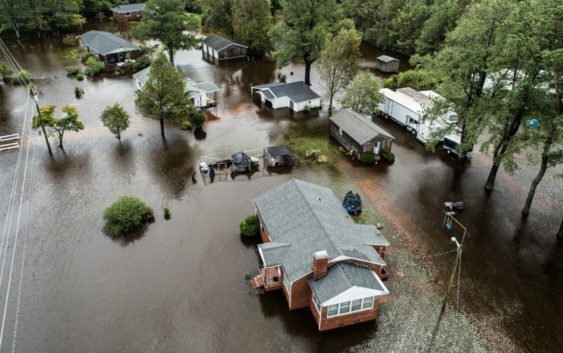- Caught on camera | Tornado touches down in Missouri
- Carolina Hurricanes playoff tickets go on sale next week
- Storms kill 6 in the South and Midwest as forecasters warn of catastrophic rains, floods this week
- Weather Impact Alert: Cold front could trigger severe weather in Houston area this weekend | See timeline
- Violent storms cut through the South and Midwest, spawning tornadoes and killing 3
‘Our world has changed’ – Eastern NC bands together to urge faster hurricane recovery

Eastern North Carolina communities still struggling to recover from recent hurricanes have banded together to accelerate financial help and to take steps to prevent debilitating flooding in the next major storm.
On Wednesday, the Eastern N.C. Disaster Recovery and Resiliency Alliance drove that point home in a news conference at the state Legislative Building in Raleigh, where they also met with individual lawmakers.
State Rep. Holly Grange, a Republican from Wilmington, steered the event, which included about two dozen officials and supportive state legislators. She said the alliance began with an informal meeting in Burgaw, and gradually took shape with a list of priorities, which members discussed with federal officials in a trip to Washington, D.C., in October.
Those priorities include:
Sign Up and Save
Get six months of free digital access to The News & Observer
#ReadLocal
▪ Expediting resources for roads and other forms of transportation to make sure there is adequate evacuation and access for emergency personnel. Coastal flooding made Wilmington inaccessible for four days during Florence.
▪ Improve public roads and buildings to lower the risk of collapses during hurricanes.
▪ Increase state funding for stream, tributary and river management to prevent flooding.
▪ Dedicate a “significant” amount of money to building affordable housing, and make better use of tax credits available in counties declared as being in a state of disaster.
Hurricanes Florence and Michael struck last year, and Grange said many people are still waiting for government aid from Hurricane Matthew in 2016.
“I look at this as an effort in southeastern North Carolina to bridge that rural-urban divide,” Grange said.
Local officials said they still have considerable work to fully recover.
“Our world has changed and we need to come together in a non-partisan, nonpolitical way,” Sen. Harper Peterson, a freshman Democrat from New Hanover County, said. “This is a crisis that will continue and repeat itself. … We’re still suffering five months later. That’s unacceptable.”
Hurricane Florence caused an estimated $13 billion in damage. The General Assembly last fall approved about $50 million as an emergency first step, and then followed up later in the month with a comprehensive plan to spend $850 million on recovery and repairs.
Gov. Roy Cooper had proposed spending $750 million immediately and $1.5 billion over several years. He ultimately approved the legislature’s spending plan, which calls for spending about half of it now and reserving the rest for when needs are more apparent, in the coming months.
At Wednesday’s news conference, officials gave a dire overview of Eastern North Carolina today.
In Duplin County alone, 892 homes and nine businesses were damaged by flood waters, said Wallace Mayor Charles Farrior Jr. He said it would be another four to six months before his town is back to normal.
People have sold their homes and moved away or searched for higher ground to move to. Some are still paying for relief efforts out of their own pockets because of delayed government assistance, he said.
Steven Barger, mayor pro tem of Boiling Springs Lakes, said the community has spent $1.5 million on storm recovery so far but will have to spend more than $18 million to complete needed work, and town funds are dwindling.
In Whiteville, Mayor Terry Mann said the entire downtown flooded. Gradually, business owners are returning, he said, but many who had leased property are looking for safer locations in town.
Rep. Ted Davis, a Republican from New Hanover County, said significant logistical problems need to be addressed, such as figuring out what happens when flooding isolates neighborhoods, or when the airport can’t function, when to evacuate a nursing home or how to find emergency supplies and gasoline.
“It goes on and on and on,” Davis said.